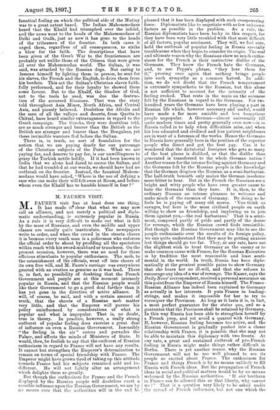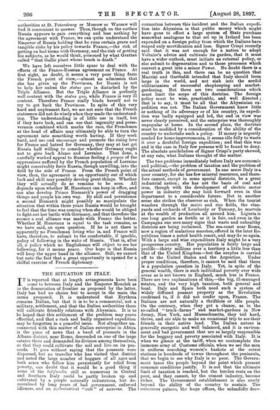M. FAURE'S VISIT.
.m FAITRE'S visit has at least done one thing. • It has made it clear that what we may now call an alliance, and not merely a political and diplo- matic understanding, is extremely popular in Russia. As a rule it is very difficult to make out what is felt by the mass of Russians, and even the middle and upper classes are usually quite inarticulate. The newspapers write to order, and when the crowd in the streets cheers it is because every tenth man is a policeman who enforces the official order to shout by prodding all the spectators within reach with his sword-scabbard or truncheon. On the present occasion, however, there was no need for these officious stimulants to popular enthusiasm. The mob, to the astonishment of the officials, went off into cheers of its own free will, and M. Faure's carriage was everywhere greeted with an ovation as genuine as it was loud. There is, in fact, no possibility of doubting that the French Government and people are at this moment intensely popular in Russia, and that the Russian people would like their Government to go a good deal farther than it has yet gone in the direction of active alliance. It will, of course, be said, and with a certain amount of truth, that the shouts of a Russian mob matter very little, and that the Emperor will pursue his policy uninfluenced by considerations of what is popular and what is unpopular. That is, no doubt, true in theory. In practice, however, a really strong outburst of popular feeling does exercise a great deal of influence on even a Russian Government. Insensibly "the feeling in the air" enters and pervades the Palace, and affects the minds of Ministers of State. It would, then, be foolish to say that the outburst of Russian enthusiasm in regard to France will not have any results. It cannot but strengthen the Emperor's determination to remain on terms of special friendship with France. The Emperor might have grown tired of taking up this attitude towards France had his Siubjects remained cold and in- different. He will not lightly alter an arrangement which delights them so greatly. But though the enthusiasm for France and the French displayed by the Russian people will doubtless exert a sensible influence upon the Russian Government, we are by na means sure that the authorities will in the end be pleased that it has been displayed with such overpowering force. Diplomatists like to negotiate with as few unknown factors as possible in the problem. As a rule, the Russian diplomatists have been lucky in this respect, for they have been very little troubled with that most difficult of all factors, popular sentiment. They will, we feel sure, hold the outbreak of popular feeling in Russia specially troublesome when they begin to consider its origin. The real and ultimate reason why the Russians show so much enthu- siasm for the French is their instinctive dislike of the Germans. They know the French hate the Germans, and, to use Pepys's phrase, "they love them for it," proving once again that nothing brings people into such sympathy as a. common hatred. In addi- tion, we do not doubt that the French temperament is extremely sympathetic to the Russian, but this alone is not sufficient to account for the intensity of the feeling evoked. That rests in the main on the soreness felt by the Russians in regard to the Germans. For twc hundred years the Germans have been playing a, part in Russian life which, however necessary and useful, would have made a far more amiable and less bumptious people unpopular. A German—almost universally till quite modern times and pretty generally even now—is in Russia called in to help when difficulties arise, and when his less educated and civilised and less patient neighbours are in want of a foreman of the works. Hence the Germans in Russia have generally been in the position of the superior people who direct and get the best pay. Can it be wondered that the dictatorial foreigner who gets so many of the best places is disliked, or that the dislike thus generated is transferred to the whole German nation Another reason for the intense feeling against Germany and the Germans felt by the Russian people is the knowledge that the German despises the Russian as a semi-barbarian. The half-truth beneath only makes the German insolence more bitter to bear. But in the French the Russians see a bright and witty people who have even greater cause to hate the Germans than they have. It is, then, to the ordinary Russian an intense pleasure to welcome and make much of the enemies of Germany. By doing so he feels he is paying off many old scores. You think us savages, but here is the most civilised people on earth willing to show us friendship, and imploring us to join them against you,—the real barbarians.' That is a senti- ment, composed partly of pride and partly of the desire for revenge, which the Russian crowd finds irresistible. But though the Russian Government may like to see the people enthusiastic over the results of its foreign policy, we can quite understand that they may be getting anxious lest things should go too far. They, at any rate, have not the slightest wish to treat Germany as the enemy or to make common cause with France, for the Russian Executive is by tradition the most reasonable and least senti- mental in the world. In truth, Russia has been diplo- matically at the greatest possible pains to show Germany that she bears her no ill-will, and that she refuses to encourage any idea of a war of revenge. The Kaiser, says the Daily News' correspondent, received a personal assurance on this point from the Emperor of Russia himself. The Franco- Russian Alliance has indeed been explained to Germany as actually in her interests. It puts France in leading- strings, and makes it impossible for her to try to reconquer the Provinces. As long as it lasts it is, in fact, a most perfect guarantee for the status gun, and so a guarantee that the Provinces shall be retained by Germany. In this way Russia has been able to strengthen herself by a French prop, and yet avoid a quarrel with Germany. If, however, Russian feeling becomes too active, and the Russian Government is gradually pushed into a closer relationship with France, it is possible that she may not be able to maintain this diplomacy with two fronts. At any rate, a great and sustained outbreak of pro-French feeling in Russia might make things rather difficult in Berlin. There is yet another reason why the Russian Government will not be too well pleased to see its people so excited about France. The enthusiasm for France and things French is by no means unlikely to fill Russia with French ideas. But the propagation of French ideas in social and political matters would be by no means welcomed by the Russian authorities. If our brethren in France can be allowed this or that liberty, why cannot we ? ' That is a question very likely to be asked under the spread of French influences, but not one which the authorities at St. Petersburg or Moscow or Warsaw will find it convenient to answer. Thus, though on the surface Russia appears to gain everything and lose nothing by the agreement with France, we can quite understand the Emperor of Russia holding that he runs certain grave and tangible risks by his policy towards France,—the risk of getting on bad terms with Germany, and the risk of getting his subjects, as he would think, poisoned by what Grattan called "that Gallic plant whose touch is death."
We have left ourselves little space to deal with the effects of the Franco-Russian agreement on France. At first sight, no doubt, it seems a very poor thing from the French point of view,—almost an admission that she has given up the Provinces, for Russia is not to help her unless the status quo is disturbed by the Triple Alliance. But the Triple Alliance is perfectly well content with the status quo, while France is very ill content. Therefore France really binds herself not to try to get back the Provinces. In spite of this very hard and unpleasant fact, we are not sure that the French statesmen did not do wisely when they made the understand- ing. The understanding is of little use in itself, but if they have luck, and can use that ingenuity and perse- verance combined which marks the race, the Frenchmen at the head of affairs may ultimately be able to turn the agreement into something worth having. If they work hard, and use and encourage and promote the rising love for France and hatred for Germany, they may at last get Russia half willing to consider whether Germany ought not to give back Alsace and Lorraine. That done, a carefully worked appeal to Russian feeling a propos of the 'oppressions suffered by the French population of Lorraine might conceivably force Russia, though unwilling, into the field by the side of France. From the French point of view, then, the agreement is an opportunity out of which luck and skill may possibly develop great things. Whether they will actually do so remains to be seen. All depends upon whether M. Hanotaux can keep in office, and can also develop Prince Bismarck's power of dragging things and people his own way. By skill and persistence a second Bismarck might possibly so manipulate the situation that within three years Russia would be brought to feel that the time was coming when she would be obliged to fight out her battle with Germany, and that therefore the sooner a real alliance was made with France the better. Whether M. Hanotaux is equal to the task remains, as we have said, an open question. If he is not there is apparently no Frenchman living who is, and France will have, therefore, to submit to the comfortable, if ignoble, policy of following in the wake of Russia, That is, after all, a policy which no Englishman will object to see her• following, for it means peace. Our hope is that Russia will keep the upper hand in the alliance. Still, we cannot but note the fact that a great o'pportunity is °pm:led for a skilful exercise of French diplomacy.



































 Previous page
Previous page